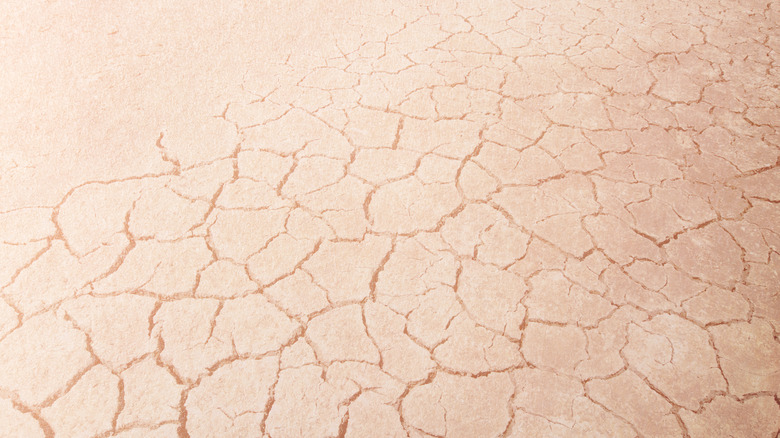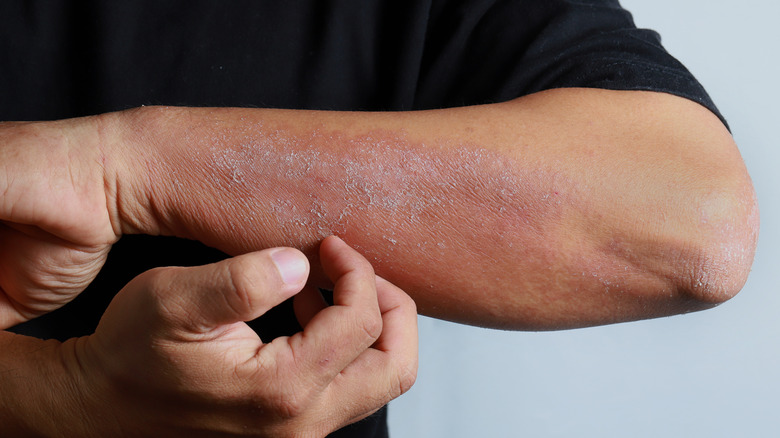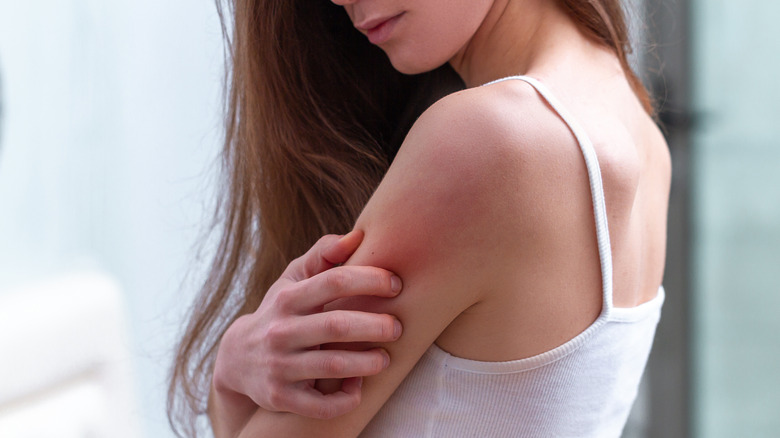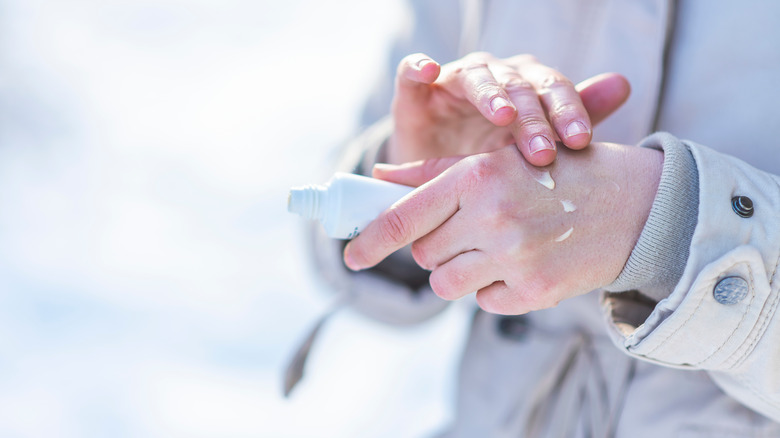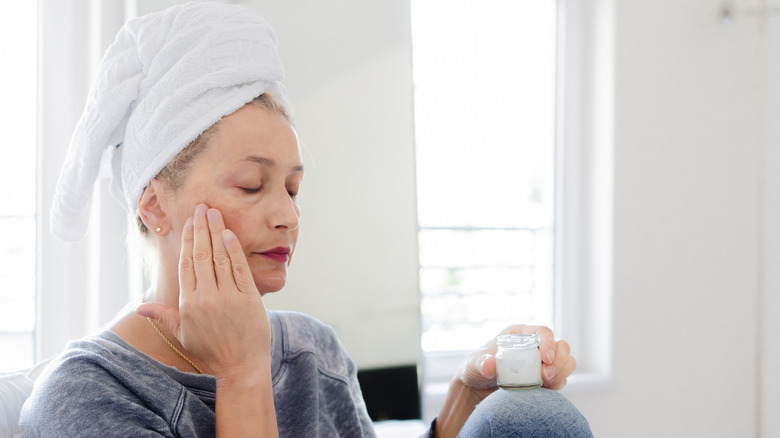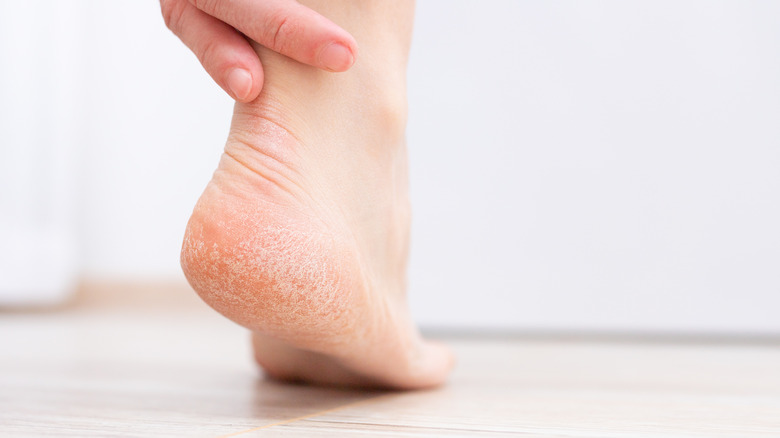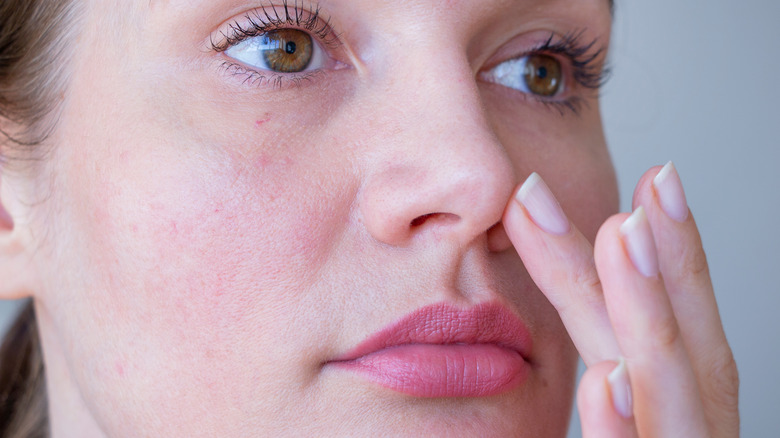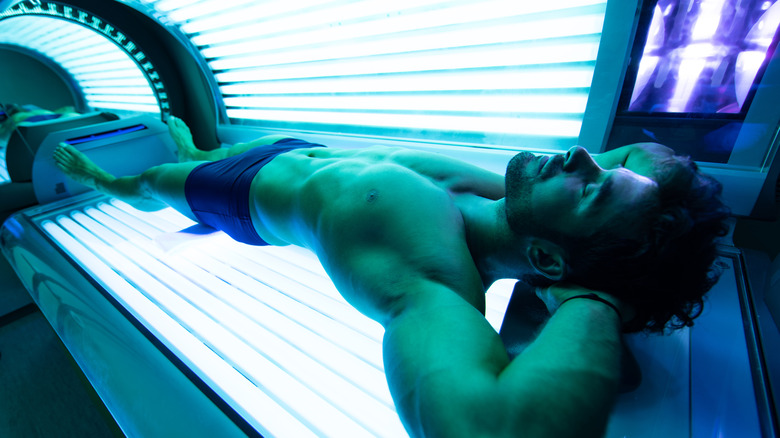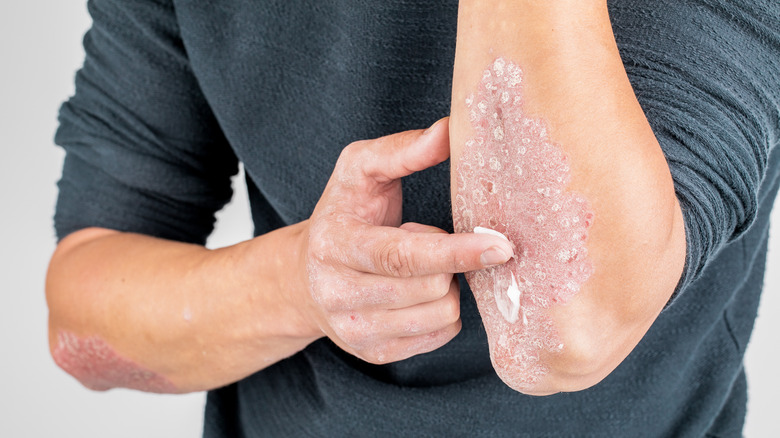Dry Skin Explained: Causes, Symptoms, And Treatments
Whether we mean to be or not, we are tough on our skin. As the largest organ in our body, our skin plays multiple roles. Not only does it protect your other organs as well as your muscles and bones, but it also helps regulate your temperature, disposes of waste, and it can even serve as the first sign that your health is amiss (via Olansky Dermatology).
Odds are that you've probably dealt with skin issues at some point in your life. Dry skin, or xerosis, is a common complaint, especially in the winter months or from those who live in arid climates. It can be uncomfortable to say the least, and can lead to other skin issues if ignored. There are many factors that can cause dry skin, but the good news is there are typically treatment options available. Knowing the symptoms to watch for, as well as risk factors can lead you on your way to having your skin looking and feeling better.
Understanding dry skin
Dry skin is fairly self-explanatory — skin that loses too much water for one reason or another and becomes dry. In fact, the reason why skin is so soft and stretchy is due to its water content, according to the American Skin Association.
To understand how your skin becomes dry, it is important to understand your skin's makeup. Skin has three layers: the hypodermis or the deepest layer, the middle layer called the dermis, and the epidermis or outer layer. The stratum corneum in the epidermis layer is responsible for hydrating our skin.
Skin stays moist thanks to sweat and oil glands, as well as natural moisturizers like amino acids, sugars, and lactic acid. When our skin gets dry, it means "lipids are depleted and there is not enough water in the stratum corneum for it to function properly," according to the American Skin Association. Once the skin becomes dry, it can lead to the irritation and discomfort many associate with dry skin.
Dermatitis
Just as your skin is more complex than it appears, dry skin conditions can also be complicated. There are several different types of these conditions. Dermatitis is the main term used for severely dry skin (via Healthline). Under the dermatitis umbrella falls contact dermatitis, seborrheic dermatitis, and atopic dermatitis.
Contact dermatitis occurs when your skin becomes irritated due to something you came into contact with. Approximately 15 to 20% of people will experience contact dermatitis at some point in their lives (via Cleveland Clinic). Seborrheic dermatitis occurs when your skin produces too much oil and causes a scaly rash or dandruff. This may seem counterintuitive that excess oil can lead to dry skin, but the itching as a result of the rash can lead to your skin drying out. Lastly, atopic dermatitis, which is also known as eczema, is more of a chronic skin condition that causes dry, scaly patches on your skin (via Mayo Clinic).
Other dry skin conditions include diaper dermatitis (diaper rash), dyshidrotic dermatitis, neurodermatitis, nummular dermatitis, and perioral or periorificial dermatitis.
Symptoms of dry skin
Having dry skin on occasion is common and often nothing to worry about; however, severe dry skin may require treatment. If you have excessively dry skin. you may notice a rougher texture to your skin, fine lines or deep cracks in the skin that may bleed, itching, flakey skin, or pain like stinging or burning, according to the American Academy of Dermatology Association.
Your skin may also feel raw from cracking and bleeding, or even start to peel. Any breaks can also lead to skin infections, so you should be on the lookout for yellowing, crusting, fluid leaking, or swelling of the skin. Discoloration, like gray, ashy skin, as well as a feeling of skin tightness after bathing or swimming are also some symptoms dry skin sufferers may experience (via Mayo Clinic). Additionally, chapped or cracked lips are a sign of dry skin, explained Cedars-Sinai Medical Center.
Environmental factors
The reason you may be suffering from dry skin could come down to where you live. "Dry air (low humidity), probably the most common cause of dry skin, causes an evident reduction of water content," explained the American Skin Association.
Winter is known as an especially tough time for dry skin, as the cold outdoor temperature combined with the use of central heating, as well as space heaters and fireplaces, cause further drying (via Mayo Clinic). However, dry skin can also occur in the summer months as prolonged exposure to air conditioning can result in skin dehydration, according to the American Skin Association. Tobacco smoke and air pollutants are other environmental factors that can lead to dry skin (via Cleveland Clinic).
As for those long, hot baths or showers you enjoy year-round? Well, unfortunately, those can worsen dry skin conditions — especially if you are using harsh soaps or ones that have fragrances that irritate your skin.
Medical conditions and medications
Dry skin can be a symptom of certain health conditions. Diabetes, kidney disease, thyroid disease, anorexia, and HIV can all result in dry skin via a lack of water or malnutrition (via Medical News Today).
Still stumped as to why you have dry skin? Check out your medicine cabinet. Drugs like diuretics or topical and systemic retinoids may cause dry skin (via American Skin Association). Some cancer treatments can lead to dry skin as well. Additionally, other very common drugs like antacids, antihistamines, blood pressure medications, and laxatives can all dry out the skin, according to Medical News Today.
You might also want to consult your doctor about upping your vitamin or mineral intake, as some deficiencies can lead to dry skin. If you aren't getting enough vitamin A, vitamin D, iron, zinc, or niacin, for example, you could experience drier-than-usual skin (via American Academy of Dermatology Association).
Some people are more susceptible to dry skin
Unfortunately, dry skin accompanies aging. In your 40s, your skin starts to change as it produces less of an oil that keeps your skin soft called sebum (via American Academy of Dermatology Association). Dry skin is also likely in the elderly due to hormone imbalances in menopause or conditions like hypothyroidism or hyperthyroidism, according to the American Skin Association.
Some complexions are also more prone to drying. People with Black, brown, and fair skin are more likely to develop dry skin than those who have a medium complexion, according to the American Academy of Dermatology Association. Similarly, genetics also play a role in dry skin, meaning you are more likely to have dry skin if your family members have experienced it (via Cleveland Clinic).
Your career can even play a role in whether or not you will experience dry skin. If you are in an industry that requires a lot of handwashing or wetness, your skin's protective layer can be stripped down. "Hairdressers, nurses, housekeepers, construction workers, cooks, florists, and metal workers often develop excessively dry skin." confirmed the American Academy of Dermatology Association.
Complications of dry skin
While dry skin isn't always a serious condition, it can go beyond just being an annoyance if left untreated. You could experience permanent damage to your skin, like discoloration, permanent itching, or patches of thick skin (via Medical News Today).
If your dry skin results in cracking or open wounds, there is also a chance for a serious viral or bacterial infection. Some people even start to experience food allergies, according to the American Academy of Dermatology Association. Scarring is a concern if you itch to the point of bleeding, and you may lose sleep over the discomfort you experience.
If you are predisposed to eczema, untreated dry skin can pave the wave for the condition to begin, according to the Mayo Clinic. It is important to note that complications are more likely to happen when the skin's protection is severely compromised. You should also be aware that dry skin is not contagious. This includes types of dermatitis like eczema (via Cleveland Clinic).
More serious conditions can resemble dry skin
You may have heard of other skin conditions or diseases like psoriasis or rosacea. Many of the symptoms overlap with various types of dermatitis. You can even have multiple skin conditions at the same time, making it all the more confusing.
So how can you tell the difference? Although rosacea causes reddened skin similar to dermatitis, its telltale signs include pimples and redness limited to your cheeks, chin, forehead, and nose. Rosacea can also occur in the eyes. "Eye involvement may appear before as well as after any skin signs or symptoms, and individuals who suspect they may have ocular rosacea should consult a dermatologist or ophthalmologist for appropriate therapy," explained the National Rosacea Society.
As for psoriasis, look closely at the scales on your skin that are commonly found in seborrheic dermatitis. In psoriasis, the scales are thicker and well-defined around the edges, according to the Cleveland Clinic.
Diagnosing dry skin
When you seek treatment for dry skin, you may start at your primary care physician; however, you could end up at a dermatologist. A dermatologist may be able to tell what type of skin condition you have just by looking at it, but the doctor will also try to determine the cause of your dry skin by asking you about your symptoms and more detailed information.
This is where your medical and family history comes into play. You may be asked if any family members had skin conditions like eczema, asthma, food allergies, or hay fever (via American Academy of Dermatology Association). You will also want to take note of when your dry skin started and if anything seems to contribute to flare-ups.
Your doctor may order tests if deemed necessary. Sometimes this involves bloodwork to see if there is an underlying cause for rash or a skin biopsy to further nail down your condition (via Cleveland Clinic). The dermatologist will also want to know what treatments you have tried and if any were successful. Combining this information with your symptoms, history, and any necessary tests should have you on your way to a treatment plan.
Treating dry skin at home
Your treatment plan may vary based on your specific situation, but overall, you can expect a treatment plan to soothe your skin and, hopefully, prevent dry skin from coming back, explained the American Academy of Dermatology Association.
Your doctor may first suggest some tips you can try at home to help mitigate your dry skin symptoms. You will likely want to trade those long, scalding showers for 10-minute warm showers instead, and shower every other day if you can get away with it (via Healthline). You should also apply moisturizer right after you are done showering to trap the excess moisture in your skin.
You can also outfit your home with a humidifier to battle the dry air in those winter months. Skip cozying up in front of the fireplace for warmth, as open flames can be extra drying for your skin. Treat your skin kindly by protecting it with winter gear and avoiding clothing made with itchy material (via American Skin Association). And it should go without saying, but resist the urge to itch or scratch!
Lifestyle factors
Lifestyle changes can have a helpful impact on dry skin. Drinking plenty of water is key to helping your skin stay hydrated — especially if you are sweating or drinking alcohol, as that can fast-track dehydration (via American Skin Association). If you are a smoker, you should consider quitting, as that can have a dehydrating effect on your skin. As for nutrition, talk to your doctor about your dietary choices and correlating outbreaks after certain meals. A gluten intolerance or food allergy could be part of the reason your skin is dry (via Cleveland Clinic). Excessive caffeine intake may also worsen your skin condition.
The products you choose to use on your body are also part of the puzzle that often leads to dry skin. Make sure your moisturizer isn't alcohol-based and use a mild, non-soap skin cleanser or moisturizing soap. Stay away from those antibacterial soaps, as those are drying, too. Consider changing out your products seasonally. Switch to a lighter, water-based lotion during the summer months if you don't seem to suffer from dry skin as often and choose a heavier-duty lotion come winter (via Healthline).
Treatment with medications
Sometimes lifestyle or environmental changes, as well as at-home remedies or product use just don't cut it. In these cases, your doctor may prescribe topical and oral medications for dry skin.
Your dermatologist may recommend a prescription moisturizer or one with active ingredients like ceramides, glycerol, lactic acid, or urea to hydrate your skin and restore the outer layer, according to the American Academy of Dermatology Association. You could also be advised to use over-the-counter or prescription ointments and creams with active ingredients like dimethicone, glycerin, hyaluronic acid, jojoba oil, lactic acid, lanolin, mineral oil, petrolatum, or shea butter (via Healthline).
If your dry skin is more severe, a steroid cream or ointment may be prescribed. If your symptoms include intense itching, antihistamine pills may be a part of your treatment plan as well, according to the American Skin Association. Other possible treatment options include hydrocortisone-containing lotions for itchiness or wet dressings for cracking skin (via the Mayo Clinic).
Prevention
Dry skin can be preventable if certain steps are taken. Washing your face and moisturizing daily should be the basis of your skin care routine. Limiting your time in direct sunlight, wearing sunscreen, and avoiding tanning beds are excellent ways to avoid excess drying (via Medical News Today).
If you have a career that requires your hands to be wet frequently or calls for frequent hand-washing, wear rubber gloves. This is especially advised if you come into contact with harsh chemicals (via Mayo Clinic).
As with many things related to your health, stress can exacerbate skin conditions, according to the Cleveland Clinic. Aim to reduce your stress by prioritizing sleep, exercising, or practicing relaxation techniques like meditation.
If you notice dry skin is related to certain food items, you may be required to make dietary changes to keep it under control. Nearly 25% of people with dermatitis herpetiformis celiac disease, according to Cleveland Clinic. You will want to be mindful of the foods you eat and when your skin flare-ups occur to narrow down the preventative measures you should take.
When to see a doctor
"If you aren't feeling good about the skin you're in or are worried about something on your skin, you should consider seeing a dermatologist," advised University of Utah Health. This is true of dry skin. If you have tried many of the tips recommended for battling dry skin and still haven't found relief, a dermatologist can help. Additionally, if your dry skin is affecting your sleep or day-to-day life or you have painful open sores, redness, or have large areas of scaling, it's time to see a dotor (via Mayo Clinic).
According to the American Academy of Dermatology Association, you may start feeling better after implementing some changes at home, but if you don't, more drastic treatment may be needed for your dry skin. Whether you have an underlying skin condition that requires more investigation or you need a prescription ointment or cream, a healthcare professional can start the diagnosis process and successfully treat your skin.


